Famed Soprano Fleming Directs Mozart Opera
BY MARC SHULGOLD
for Opera Magazine
Excerpted from Opera Magazine’s July 2025 edition. Reprinted with permission.
During July and August, the Aspen Music Festival and School (AMFS) attracts thousands of people for concerts by some of the world’s finest musicians, who are joined by a small army of young musical stars-inthe-making. The glories of the scenery and all that high-quality music prove irresistible—just ask one of the AMFS’s most illustrious alumni.
“Aspen was always my escape fantasy for a summer job,” Renée Fleming recalls of her student days. In conversation, the soprano speaks fondly of numerous performances there. It was at the AMFS where she sang her first Mozart role—the Countess in Le nozze di Figaro
Those early memories still linger: the hours of study, rehearsals, and
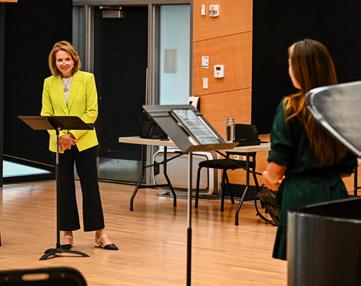
performances. She’s since returned for concerts in the Music Tent, and she sang at the gala opening of Harris Hall in 1993. Then, in 2020, her occasional links with Aspen were solidified with an appointment as co-artistic director of the newly created Aspen Opera Theater and VocalARTS (AOTVA) [along with
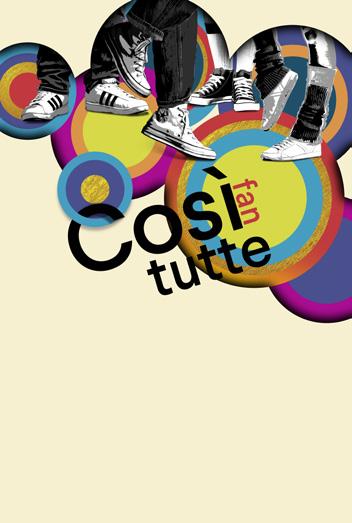
Patrick Summers, the music director of Houston Grand Opera]. It seemed an obvious move for her. “I have a tradition in my family of giving back to the next generation,” she said. “Both my parents were teachers.”
Still, she’s ready for more. This summer Fleming will make her directing debut with Mozart’s CosÌ fan tutte (July 21, 23, and 26 at the Wheeler Opera House).
Could this be the beginning of a new career? “This is likely to be my only foray into directing,” Fleming writes a few days later in a separate email. “I had plans to direct it a few years ago, but the pandemic intervened,” she writes. “I chose a piece I know well and one that presents some challenges that fascinate me.”
Word has already spread that Fleming’s concept is far from traditional.
“Having performed Così early in my career [as Fiordiligi],” she writes, “I’ve long had thoughts about how to make this comedy come alive for contemporary audiences. It’s more than two centuries old, and, while the music is timeless, the battle of the sexes that propels the plot is viewed differently now. I wanted the two young couples at the heart of the story to be high-school age, because this is absolutely a comingof-age story.
“These young people are starting to exercise their emotional muscles and testing their limits. I wanted to set it in a time and place that would be colorful, recognizable, and offer possibilities for physical comedy. And so, I hit on the idea of a community gym in the early 1980s. The Rocky movie franchise was going strong. At the same time, the fitness movement for women was really taking off for the first time, with Jane Fonda leading the way. And Yarmouth was where the professional wrestling craze in
See AOTVA , Festival Focus page 3
“An uncompromising, important voice . . . ”
TYSHAWN SOREY’S FOR GEORGE LEWIS
A Recital by the Aspen Contemporary Ensemble
Thursday, July 24
One of today’s most brilliant composers, and winner of the Pulitzer Prize in 2024 at just 43 years old, Tyshawn Sorey is a artistic force.
His work For George Lewis earned a rare space by itself at Harris Hall, as a composition to be set apart and experienced on its own.
Timothy Weiss, who conducts the performance, likens it to “a well-tended garden where fragrant melodies emerge.”
Double Genius Jam: Muhly and Kuusisto on July 26
SARAH CHASE SHAW Festival Focus Writer
When violinist Pekka Kuusisto performs Shrink—a violin concerto written expressly for him by “it” composer Nico Muhly—he describes it as “a sort of accelerated lifestyle one lives when playing it.” The piece, he says, is “extremely satisfying—like a highvelocity magic trick where everything falls into place—plus, it’s extremely beautiful music.”
Audiences will get to experience that magic firsthand on July 26 at Harris Concert Hall, when Kuusisto and Muhly put together a sort of “genius jam session” featuring some of their favorite classical “indie picks” and two of Muhly’s works written specifically for the Finnish violinist:
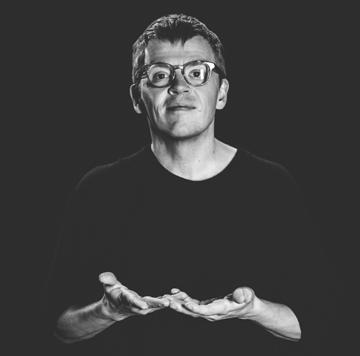
Drones & Violin and Shrink. Muhly will be at the piano, and AMFS Assistant Conductor Paul-Boris Kertsman will conduct an 18-piece ensemble.
The program offers an intimate look at the decade-plus collaboration between two of today’s most imaginative musical voices. “The very first piece that I wrote for [Kuusisto], Drones & Violin (2012) was an experiment in stasis,” says Muhly. “It’s a duo, but in each movement one of the players creates a drone, or makes a single note, or two notes against which the other player plays.”
“The challenge of the piece,” he adds, “is that each player has to determine how to create their version of a drone. One option is to simply hold the notes and play
them at the same time When Pekka plays two notes together, you hear that he’s doing this not just as a fiddle player, but as someone who really understands tone and sound and the tiny drama that can emerge from this small box, otherwise known as the violin.”
If Drones & Violin is a meditation on simplicity and resonance, Shrink is a study in compression and obsession. Written in three movements, it plays with diminishing intervals and intensifying structure. “It’s about the obsessive nature of obsession,” Muhly says. “It’s about not being able to let something go. It’s about teasing out the threads to find what’s at the heart of these intervallic obsessions.”
See Shrink, Festival Focus page 3
A Music Festival Photographic Sampler
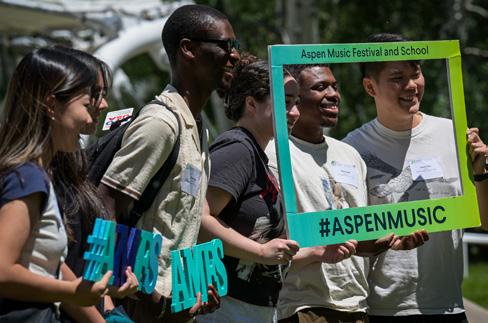
Students
at a
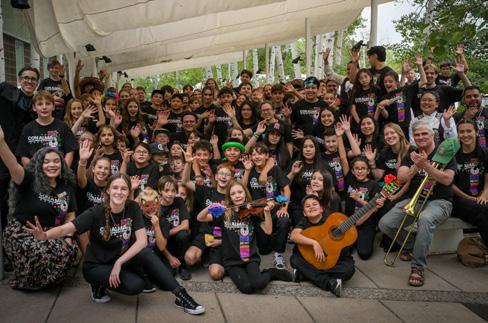
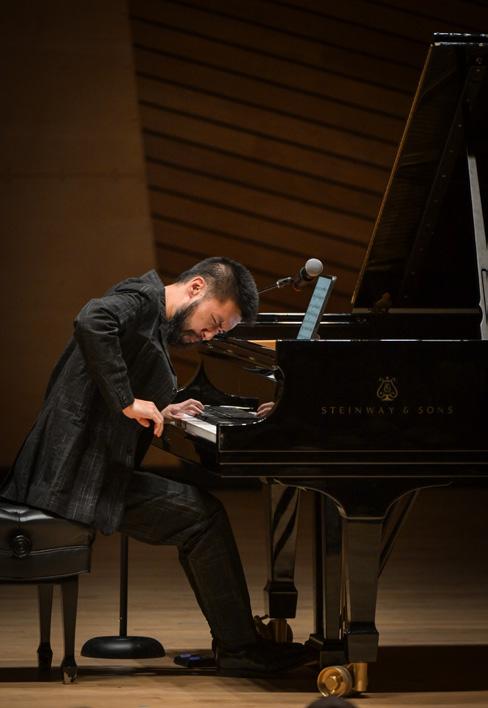
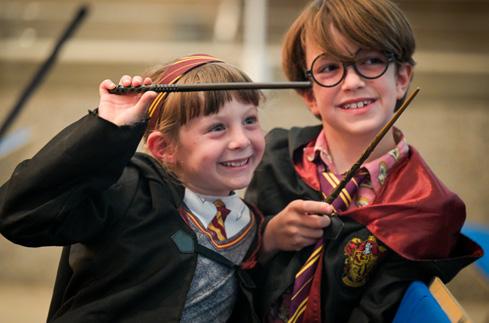
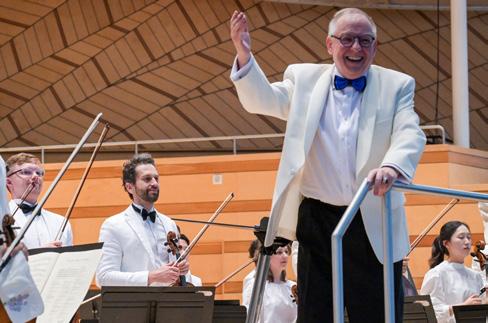
Continued from Festival Focus page 1
A Photographic Sampler,
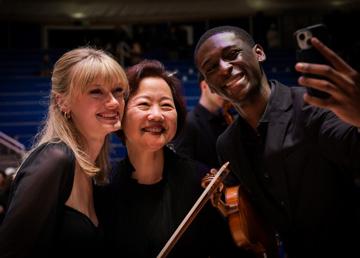
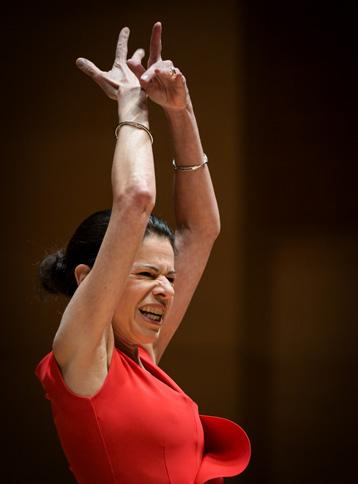
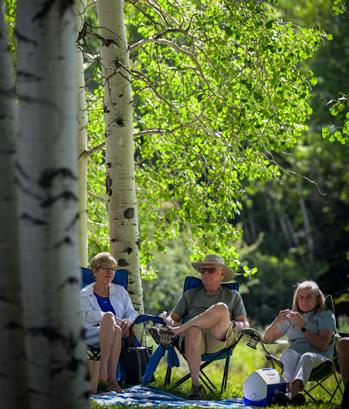
Clockwise from bottom left: Grammy-winning soprano Ana María Martínez presents an evening of storytelling through song at Harris Concert Hall with pianist Andy Einhorn. • Violinist and artistfaculty member Bing Wang (center) celebrates with students after an evening of music by John Williams. • A sunny Sunday afternoon orchestra concert on the Karetsky Music Lawn. • Pianist Joyce Yang (left) and Music Director Robert Spano (right) share a moment of levity while rehearsing for the Aspen Festival Orchestra’s Opening Sunday concert. • A child enjoys Tunes and Tales at the Pitkin County Library. • Assistant Conductor Paul-Boris Kertsman leads an evening of iconic film scores. • Conductor James Conlon, who first came to Aspen as a student in the late 1960s before launching an acclaimed career, celebrates over five decades of appearances with the AMFS.
PHOTOS BY DIEGO REDEL
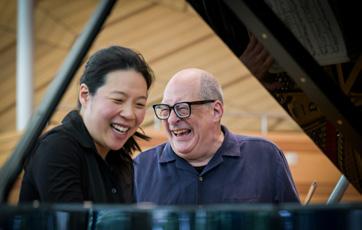
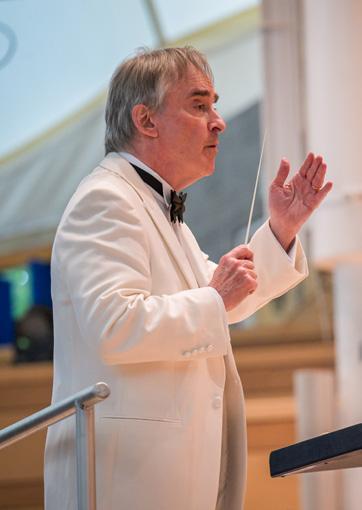
AOTVA: ‘The Hidden Art of Opera’
the U.S. got under way, right at that time. That suggested opportunities for theatricality, especially the disguises that are central to the plot of Così fan tutte.” Safe to say, this will not be your grandmother’s Così Meanwhile, her AOTVA co-artistic director, Summers, will focus his responsibilities as the production’s conductor on the singers’ technique, helping them get inside “the hidden art of opera. That will involve a lot of teach
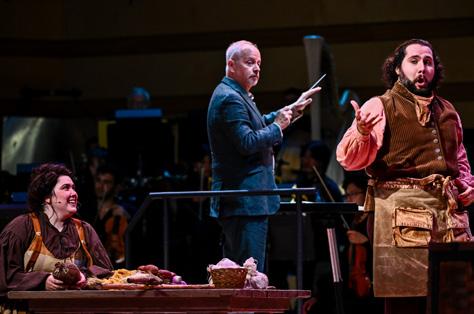
ing,” he says during a Zoom call from Houston. “You learn to read the instincts of a singer, how they digest a note.” He refers to his charges as ‘young artists.’ (“They’re not students,” he says.) “What they gain here will happen later. You can create an environment where chemistry can blossom.”
[At the peak of her storied career, it’s Fleming’s] life as a teacher that holds a special place for her—and her enthusiasm is unmistakable.
“I love working with young artists, and with young composers,” she says. “That’s the fun part. We all know how incredibly competitive the environment is for singers these days. That’s why this program [at Aspen] is so valuable.”
Fleming points out that AOTVA is being offered free of tuition charges for every singer for the first time this year. Approximately 600 applications were received, making the selection process all the more difficult.
Beyond voice lessons, there will be time for private counseling about what the future holds. “We’ll talk with them about ways they can work in their chosen field. That’s why we encourage those still in college to choose a double major. The landscape [in opera] is always changing.”
One landscape that remains unchanging is the surrounding beauty of Aspen, [which] can help bring a sense of peace to even the most anxious young singer. Summers is quite aware of that, and he encourages his resident artists to breathe the mountain air. “I tell them to notice where they are,” he says.
And will the co-artistic directors of AOTVA also be able to enjoy the surrounding countryside? “I’ll go for walks,” Summers says, “and Renée will bike to the Bells.”
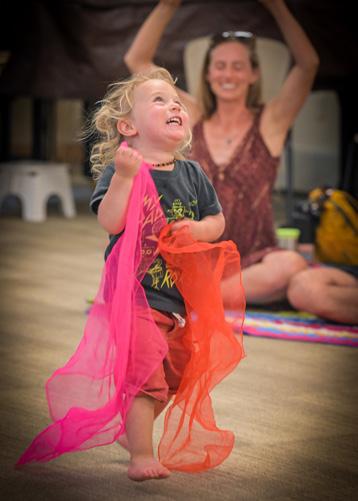
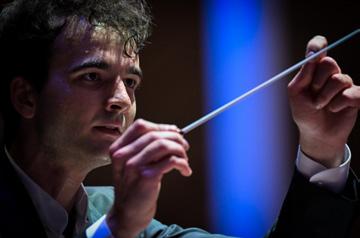
Shrink
Continued from Festival Focus page 1
In an interview with San Francisco Classical Voice, Kuusisto likened the experience of playing Shrink to a shared language between close collaborators: “a set of in-jokes between two people whose friendship is so deep that they can anticipate the noises that will emerge from their instruments.”
“Muhly writes music . . . that is fresh, modern. He’s one of the most brilliant people I know.”
AMFS Munroe President and CEO Alan Fletcher calls Muhly “one of the foremost composers of his generation. He writes music that makes a very direct emotional connection with people. It is deeply steeped in the traditions of classical music, but it is fresh. It is modern. He’s one of the most brilliant people I know.”
These days, Muhly devotes most of his time to composing, a craft he likens to puzzle-making or coding. “You write what you know to establish the baseline. Then you make yourself the challenge. It’s a bit like cooking for a group of people with very different dietary needs.”
But first comes this electrifying collaboration—a chance to witness two artists at the height of their creative partnership, exploring what sound can say when words aren’t enough.
